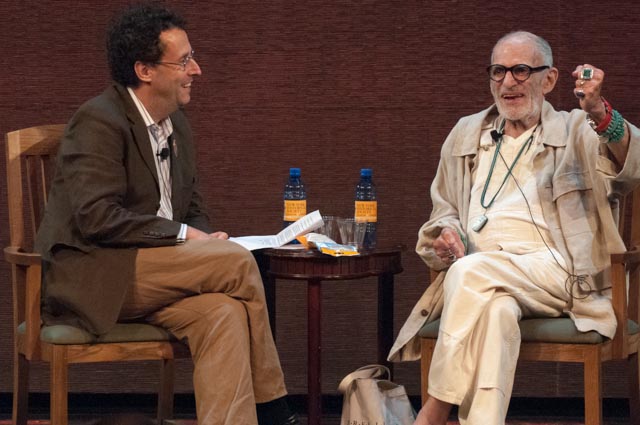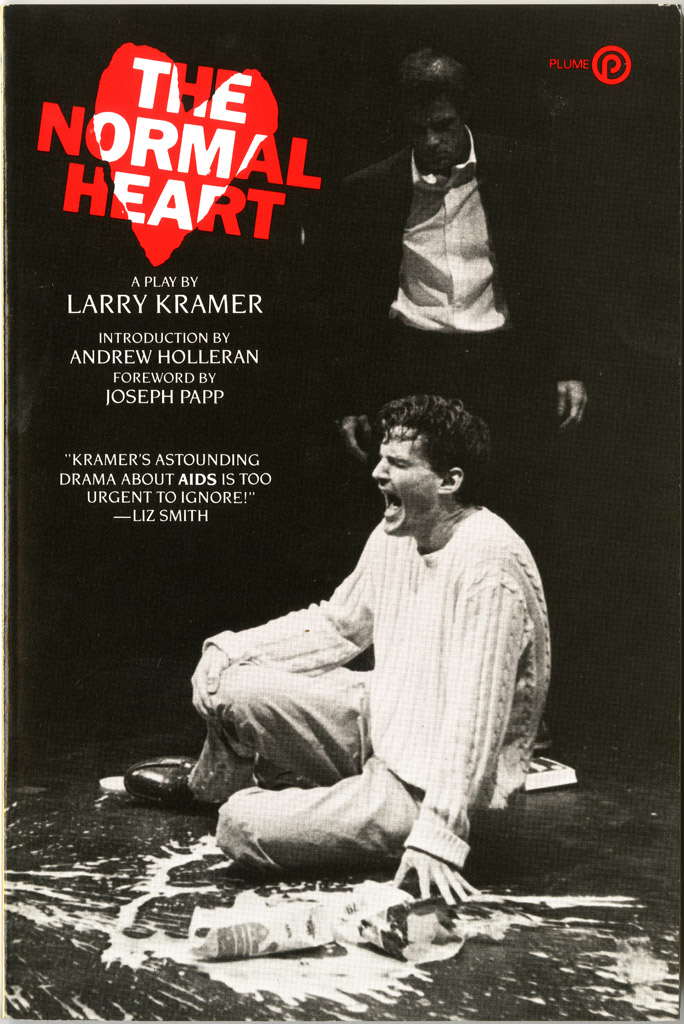Larry Kramer sits down at the New York Historical Society Museum. The Smith Auditorium is packed. Two tiers of seats, filled. He calls for lowered stage lights to better see the audience. Tony Kushner acts as evening moderator. Tonight's presentation is coincident with "AIDS in New York: The First 5 Years." (Exhibit runs June 7 -- Sept.15, 2013)

"You're really getting everything good to happen to you before you die," Kramer says his lover tells him.
"HBO is filming Normal Heart beautifully," coos Kramer. The Normal Heart is his Tony Award-winning drama about people whose lives shatter -- the first patients in New York to have HIV/AIDS.
Julia Roberts stars in the film adaptation of the play. She's been spotted in past days on Fire Island and in Soho.
"I walked onto the set today," Kramer says. With a smile, he mentions a disco peopled by extras, "It was the biggest crowd since Ben-Hur." I said, "Hey, guys, we won! And the crowd went crazy." Kramer speaks of the Supreme Court's intervention in the gay marriage debate, headline news this afternoon.
Kushner asks about the script, if there were changes.
"A play is a play. A movie's a movie," Kramer replies. "I've written over the years so many plays for nameless people [audience laughter], but this director is the greatest I've ever worked with, and I've worked with many." The director of the HBO film is Glee creator Ryan Murphy. "He wants people to really see how awful those years were -- how awful the disease was," explains Kramer.
"The movie writes in more about the doctor. She was this woman in a wheel chair," Kramer goes on with great enthusiasm, "I just loved writing her!" It was the earliest days of infection here in New York. Julia Roberts plays Dr. Emma Brookner in the film. Dr. Brookner survived polio.
Kushner: "Do you feel happy?"
Kramer: "I've never really felt unhappy through all the awfulness because I always had hope. We played hard and that was our mourning."
Kramer says the worst times of the epidemic were in the 1990s. "Suddenly, yesterday, we were loathed. Today we're only hated."
Kushner asks if Kramer expanded the political scene for the film and he answers, "I say Koch. I say Reagan. I say David Sencer, also a hideous person." Senser was the city health commissioner.
"I looked for Koch's lover Richard" (the surname is shouted forth from the audience) "to come out and say Ed Koch is gay, and I couldn't find him. Then at an event, this guy comes over. My name is Richard. He proceeded to tell me every detail about their love life."
"You've always been brave as a writer," Kushner tells Kramer. "You say what others find unsayable. I come up with all sorts of Baroque ways to avoid writing pretty much anything -- my name!" cracks Kushner.
"It was just painful to remember it all. How I felt. Things that happened were so raw. That's what motivated me. I don't know where that came from, but I'm glad I have it." Kramer tells us what it is like for him as a passionate artist, to write. "I just love to write. I don't like being away from Mission Control" -- his computing system.
"It's a history that's gotta be told" And Kramer is telling it to everybody. His forthcoming book in two volumes (Farrar, Straus and Giroux) is The American People. It is the history of gays in America, Kramer says. "We were allowed to die."
Tony Kushner pipes up, "The book includes (SCOOP ALERT)!" But Kramer says not to tell so I don't write it, but it's something really good.
Kushner says, "We're actually seeing the world change."
"I haven't experienced until recently that (to be the case). It gets in the way," Kramer waves his hand like he's shaking out a handkerchief. He's dressed in loose white canvas trousers and jacket, a sort of Buddhist-safari casual. Kramer's wristwatch is big and red.
His famed agent, Margaret "Peggy" Ramsay told Kramer to never listen to what people say about you, because it gets in the way. "I've always clutched to that" he continues with another disclosure: "Our theatre is all very personal. An investigation of navels."
"I don't call it a gay community. It's too cozy a word. We're a gay population... I've never been able to understand why we've been so passive. During the ultimate death ('89 -- '90s), you're not going to fight for your life? It makes me angry/sad, because I think we're wonderful people. Not fighting is our tragic fault."
"We are potentially a powerful population." He's longed to marry, Kramer says wistfully, "and now we will."
Kramer clears his throat with a little backward toss of his head. Speaking tonight, he's been expressive with his hands. The talk is ending. Kramer's arms rest on his chair, his hands at last still, palms up. Larry wears large turquoise rings on almost every finger of each hand, no socks, big black glasses, and black loafers. His hair is trim, a Caesar cut.
"I don't know why I was spared. I did everything everybody else did. The thought doesn't escape me."

Reflecting, Kramer continues, "I think anybody who lived through it can never forget" . . . "personally so painful" . . . "my child was taken away from me." (Kramer refers to the AIDS Coalition to Unleash Power -- ACT UP)
"ACT-UP was democratic to a flaw, with nobody in charge. Every day you came in, there were names on the blackboard of everyone who had died since the last meeting."
At one point, Kramer, diagnosed with liver cancer and forbidden a transplant because of his HIV status, thought he would die. "Okay. I did the best I could," he says he said to himself. Only Larry Kramer isn't dead. He's right here with us in the stage lights.
Kramer on Kramer: "You see something wrong, you fight back. How do you fight back? You figure it out."
The audience gives Kramer a standing ovation.
June 26, 2013
Both images provided by the Museum: Tony Kushner interviews Larry Kramer on the legacy of The Normal Heart, gay rights and HIV/AIDS at the New-York Historical Society. Credit: Howard Heyman